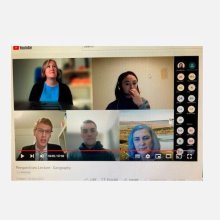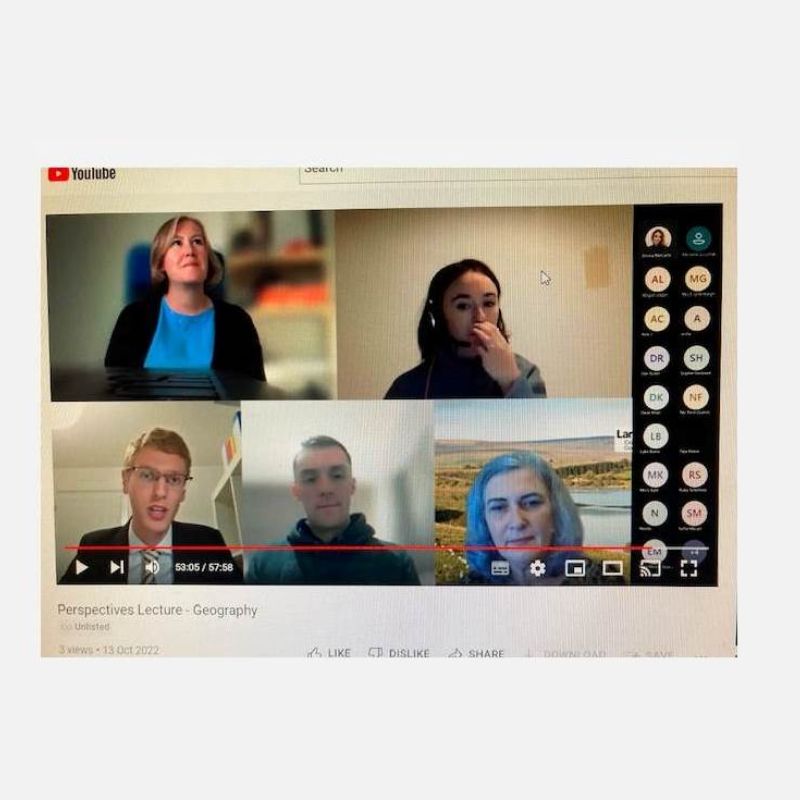
Addressing a public online audience, four former pupils of Bolton School came together via Zoom to talk about Geography-related careers in the latest lecture in the School’s Perspectives series.
The first subject-related presentation saw two Old Girls and two Old Boys consider why students might consider careers associated with a Geography degree, the challenges they might face and what the future holds for the sector.
Rachel Crompton (Class of 1983), a Chartered Civil Engineer with over 30 years’ of experience of managing and delivering highway and drainage-related services and projects, was the first to offer her thoughts. Rachel told how she is currently a Flood Risk manager for a substantial Lead Local Flood Authority and explained how her work focuses on both natural and built environments. She talked about the National Flood and Coastal Erosion Risk Management Strategy for England and the importance of constructing climate resilient places. Using maps of Withnell Fold in Lancashire, she illustrated the kind of project she is often involved with – her current challenge, working with her team and United Utilities, being how to ensure housing stock is not flooded in the area. Increasingly, she said, she is keen to try and find ways of diverting potential flood water through natural channels.
Rachel recapped a number of work experiences after leaving Leeds University, including working on roads and bridges and large projects such as the building of a car park at Manchester Airport; all of which made her realise that she wanted to work on sustainable projects.
Paul Greenhalgh (Class of 2015) is now in his second year as a Geography Teacher at Berkhamsted School, having studied Geography at Cambridge. Answering the question of why pupils might find a Geography-related career fulfilling, he offered an ‘A, B, C, D’ answer. ‘A’, he said, was for the awe and wonder of the subject; ‘B’ represented working towards a better, informed world; ‘C’ was for how the subject is critically relevant, backing up his point with a quote from Michael Palin who said: ‘Geographers hold the key to the world’s problems’. ‘D’, Paul said, was for ‘door opening’ as he pointed towards the many roles students from his course had gone on to, including in Urban Planning, HR, GIS, Counter Terrorism, the Civil Service, in Parliament as Assistants to MPs, in teaching, sustainable fashion, property and real estate and in a charity helping Afghan refugees! Paul felt it was impossible to predict the future, reminding the audience that two thirds of secondary pupils will work in jobs that don’t yet exist, but he did say that Geography would certainly give you skills for the future – in areas such as critical thinking, evaluation, oral and written communication, GIS, IT, analysis, data collection and presentation. He concluded by saying that Geography is shaking off some of its negative connotations and is now a serious facilitating subject for university entry.
The most recent leaver, Tom Mair (Class of 2018), told how he had recently taken up a post as a Graduate Water Consultant with a large American multinational infrastructure firm. His work, he said, revolves around making sure that new developments aren’t in danger of being flooded or of causing flooding. Considering the question of why study Geography at university, Tom said it holds appeal because is a very diverse subject with both human and physical elements and that there is often the possibility of tailoring your degree to your interests as you go along. Geography, he said, is an applied science that deals with real world issues and he told how, having spent a lot of time in the laboratory at university, he had come to realise that the physical side was where his own interests lay. ln order to succeed in the field, he said you needed analytical abilities and communication skills and, given his own experience in applying for a job, a fair bit of resilience as you put in lots of applications, sit interviews and take tests.
Jennifer Joule (Class of 2010) introduced herself as a Senior Planning Officer at Teignmouth District Council. She too had studied Geography at Cambridge and had then gone into teaching for 2 years before gaining a wide range of work experience and undertaking an MSc in Planning at the University of Plymouth. She told how she then worked in the private sector as a Planning Consultant for three years at Lichfields in Bristol. Her future ambition, she said, is to work for the Planning Inspectorate, the central government body which determines all planning appeals.
Jennifer also provided real-life examples of the work she might undertake and told how planning involves a wide range of skills. These included, she said, fairness and impartiality, an appreciation of urban design and architecture, networking and sales (particularly in the private sector), an ability to comprehend and utilise technical information from a wide range of specialist areas, to be able to communicate with a wide variety of stakeholders but, most importantly, time management and organisation capabilities. Addressing the question of why pupils might enjoy a geography-related career, she said it is often rewarding work that makes a real difference, that it is often focused on the future, that it provides opportunities to travel and get out on site and in the field, that there is a great deal of variety and, also, the opportunity to work anywhere in the country.
The questions and answer session considered how students might secure work experience, how closely planners work with local agencies to mitigate flood risk, whether there is enough money in flood management, what Paul might have done if he’d not become a teacher, top tips for applying to university, what A level subjects complement Geography and what the Geography curriculum might look like in the future.
You can watch the full Perspectives: Geography lecture through this link.







.jpg&command_2=resize&height_2=85)
.jpg&command_2=resize&height_2=85)














